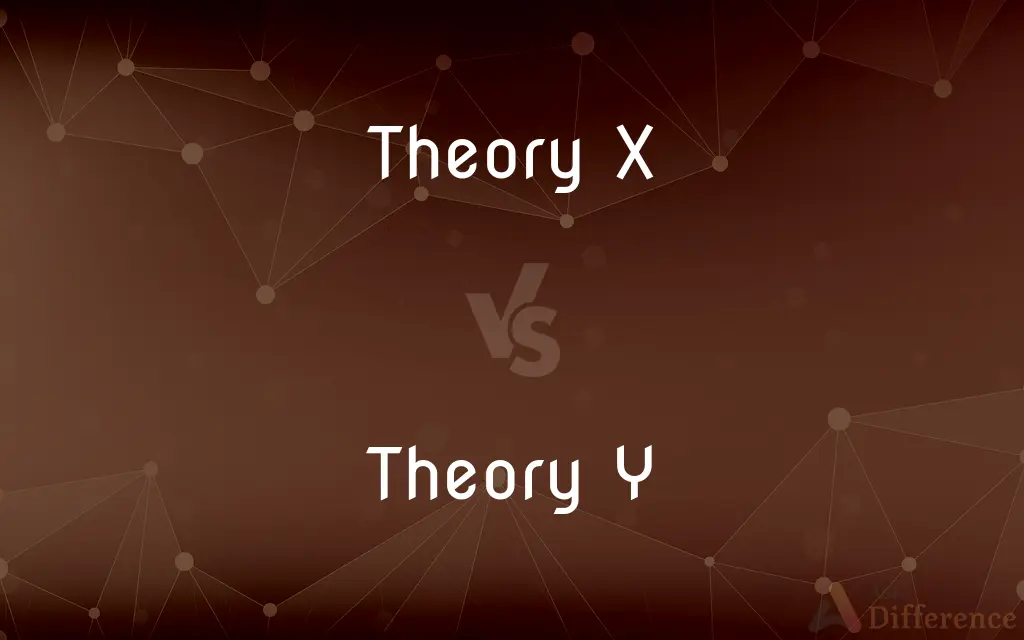Theory X vs. Theory Y — What's the Difference?
By Tayyaba Rehman & Fiza Rafique — Published on October 23, 2023
Theory X assumes employees are inherently lazy and need strict supervision, while Theory Y believes employees are self-motivated and thrive on responsibility.

Difference Between Theory X and Theory Y
Table of Contents
ADVERTISEMENT
Key Differences
Theory X and Theory Y are management theories that describe contrasting views on human behavior at work. Theory X posits that individuals are inherently lazy, dislike work, and need close supervision to ensure productivity. This perspective contends that without strong management oversight, employees would not be sufficiently motivated to achieve organizational goals.
In contrast, Theory Y holds a more optimistic view of workers. It posits that employees can be self-motivated, proactive, and responsible. Theory Y believes that given the right environment and opportunities, employees will naturally want to perform at their best. This perspective emphasizes the intrinsic motivation and the potential for growth in every worker.
While Theory X promotes a top-down approach with strict supervision, Theory Y encourages a collaborative approach, allowing employees greater autonomy and participation in decision-making. The former is more authoritarian, assuming that external rewards and punishments drive motivation, while the latter is participative, believing in harnessing an individual's innate desire for personal growth and fulfillment.
The adoption of either Theory X or Theory Y by management can significantly shape an organization's culture, influencing everything from communication styles to performance evaluation. While many modern organizations lean towards Theory Y, understanding both perspectives is crucial for effective management and human resource strategies.
Comparison Chart
Primary Assumption
Employees are inherently lazy and unmotivated.
Employees are self-motivated and responsible.
ADVERTISEMENT
Management Style
Authoritarian and directive.
Participative and empowering.
Motivational Basis
External rewards and punishments.
Intrinsic motivation and personal growth.
Employee Autonomy
Limited due to strict supervision.
Encouraged, believing in employees' potential.
View on Responsibility
Concentrated at the top, employees avoid responsibility.
Shared, employees naturally accept and seek responsibility.
Compare with Definitions
Theory X
Assumes external motivation is primary.
Due to their belief in Theory X, managers used incentives to boost productivity.
Theory Y
Posits that employees desire meaningful work.
Under Theory Y, tasks were designed to be fulfilling and purpose-driven.
Theory X
Proposes strict supervision is necessary.
The company's high monitoring levels were indicative of Theory X.
Theory Y
A belief that employees are intrinsically motivated.
The startup's culture embraced Theory Y, giving employees autonomy.
Theory X
Holds a pessimistic view of employee potential.
Despite the team's potential, the manager's adherence to Theory X held them back.
Theory Y
Assumes workers seek and accept responsibility.
With Theory Y in practice, team members eagerly led their projects.
Theory X
A management belief that employees are lazy.
The factory operated on Theory X principles with tight supervision.
Theory Y
Believes in the potential for employee growth.
Believing in Theory Y, the organization heavily invested in training programs.
Theory X
Believes employees avoid responsibility.
Under Theory X, decision-making was centralized, assuming workers avoided duties.
Theory Y
Advocates for a participative management style.
Theory Y was evident in the company's collaborative decision-making process.
Common Curiosities
Are Theory X and Theory Y mutually exclusive?
No, they represent two extremes, and many organizations fall somewhere in between.
Which theory is more modern?
Theory Y is considered more modern, emphasizing empowerment and intrinsic motivation.
Can an organization shift from Theory X to Theory Y?
Yes, through changes in management practices and organizational culture.
Does Theory X believe in punishment as motivation?
Yes, it relies heavily on external rewards and punishments.
Is Theory Y always better than Theory X?
Not necessarily; the best approach depends on the organization and its specific context.
Does Theory Y support employee training?
Yes, it believes in nurturing employees' potential for growth.
How does Theory X view employee potential?
Theory X tends to view employees as needing guidance due to inherent laziness.
Is Theory Y optimistic about human nature?
Yes, it believes in the intrinsic motivation and positivity of employees.
Are startups more inclined towards Theory Y?
Often, as many startups emphasize autonomy, creativity, and growth.
Can a manager's belief in Theory Y boost employee morale?
Generally, yes, as Theory Y trusts and values employee contributions.
Is Theory X more control-oriented?
Yes, it emphasizes close supervision and control.
Does Theory X promote centralization?
Yes, decision-making is typically concentrated at the top in Theory X settings.
How does Theory Y view team collaboration?
It encourages it, believing that employees naturally work well together.
What's a primary tool for Theory X managers?
External motivators like bonuses or threats of punishment.
Are there theories beyond X and Y?
While X and Y are foundational, various other management theories have been developed over time.
Share Your Discovery

Previous Comparison
Consumer Goods vs. Capital Goods
Next Comparison
Homophones vs. HomonymsAuthor Spotlight
Written by
Tayyaba RehmanTayyaba Rehman is a distinguished writer, currently serving as a primary contributor to askdifference.com. As a researcher in semantics and etymology, Tayyaba's passion for the complexity of languages and their distinctions has found a perfect home on the platform. Tayyaba delves into the intricacies of language, distinguishing between commonly confused words and phrases, thereby providing clarity for readers worldwide.
Co-written by
Fiza RafiqueFiza Rafique is a skilled content writer at AskDifference.com, where she meticulously refines and enhances written pieces. Drawing from her vast editorial expertise, Fiza ensures clarity, accuracy, and precision in every article. Passionate about language, she continually seeks to elevate the quality of content for readers worldwide.
















































